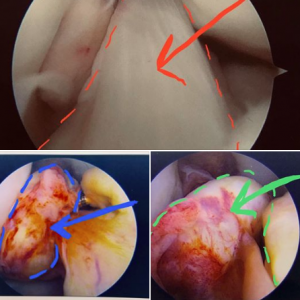Our ACL (anterior cruciate ligament) is the major ligament in our knee that provides stability. It helps keep our knee together and controls the back and forth motion of the knee. A torn ACL is common among young athletes who repeatedly twist, turn, and participate in stop and go movements associated with soccer, football, basketball and hockey. The ACL can be torn as a result of any of these activities including taking a hard hit from the side, resulting in the knee joint to become over extended.

This is what it looks like inside of the knee.The image with the red arrows reveals a normal ACL while the image with the green and blue dotted lines and arrow show a torn, blown out ACL.
Tearing your ACL not only makes your knee unstable, it can also mean another part of the knee is injured as well. An ACL injury is most often signaled by a popping noise, severe and constant pain, as well as some loss of motion.
A physical examination is needed to diagnose such an injury, though an X-ray or MRI may also provide a clearer picture. In order to repair the ligament, surgery is required. The only way to mend a torn ligament is to reconstruct it. Most orthopaedic surgeons do this by using a tissue graft as scaffolding for a new ligament to grow on. Part of the hamstring tendon or the central part of the patellar tendon are often used as an autograft in these cases.
Because regrowing a ligament takes time, it is generally a 6 month recovery period before one can resume their normal activities. Older, inactive patients may not require surgery and simple methods such as bracing, physical therapy, as well as icing and elevation can help reduce the swelling and pain.
While an ACL surgery requires a long road of recovery and rehabilitation, it is worth the process in order to regain the full function of your knee. If not treated properly, chronic pain, arthritis and the limited use of your knee can hinder your lifestyle.
If you have sustained an ACL injury, or you have any questions about ACL injuries and the reconstruction surgery, call Dr. Grossfeld’s office at 502-212-2663 for more information.

Recent Comments